Listen to this Podcast:
Listen on Anchor Listen on Spotify Listen on Apple Podcasts
SUMMARY
- Are you hesitant about raising your prices? Are you worried that raising your prices means you’ll have to work a lot harder? Or maybe you have this internal self-talk that says you don’t deserve to charge more. In this episode of The No Pants Show, The No Pants Project founder Mike Shreeve shares six reasons why you should raise your prices.
- The longer you stay charging lower prices, the higher the risk of your business shutting down. If your profit margin is too small, it takes very few bad things to happen before your business goes kaput. Raising your prices isn’t about being selfish; it’s about building a healthy business that can thrive over the long term.
- Reason #1: Fewer clients at higher prices equals deeper attention to each of those clients.
When you’re constantly shifting your attention between different projects, you’re never able to turn in your best work; you’re only giving each client your surface-level work at best. Deep attention is what enables you to see things that you don’t normally see and come up with your best ideas. - Reason #2: Raising your prices allows you to pay for training so that you can become better at delivering on your promises.
When you include an education budget in your pricing, you become better at what you do. You don’t have to wait and invest in training before you get your first client; you can develop your skills while you run your freelance business. Just be sure to be transparent with your clients. - Reason #3: Less financial stress equals better focus and creativity.
For most people, most of their life’s stress comes from money, or a lack thereof. If you’re able to pay your bills comfortably, your stress levels go down and you get better at creativity and empathy, which benefits not only yourself, but also your clients. - Reason #4: Clients who pay more have less drama.
High-paying clients tend to be easier to work with. Ever noticed how people do crazy things when they’re financially stressed out? We look at price as a fixed number, but it’s really a percentage of what someone who’s paying you has and what their expectations will be as a result. Who you’re asking for money determines the expectation and the ability. - Reason #5: Grown-up expenses.
When most freelancers are setting their prices, they’re only thinking about how much they need right now and not taking into account the grown-up expenses such as taxes, insurance, and savings. Mike recommends setting aside two years of operating expenses and one year of living expenses, so that in case something bad happens, you’ll have a financial cushion to land on. - Reason #6: When you raise your prices, you have a budget to hire help.
Another way to reduce your stress levels and increase your focus is to hire help, which you can only do if your services are priced appropriately. Hiring staff, mentors, and household help will have a positive impact on your business; you can take better care of your clients’ needs when your own needs are being taken care of. - Don’t look at price as a battle. Instead, see it as a means to become the best version of yourself and contribute to your clients’ goals.
HOT NEWS & DEALS
- Free Training! The No Pants Workshop
For anyone serious about owning their own successful (yet flexible) business. Learn how to quit your job and leverage your talents to live the ultimate freelancer freedom lifestyle! Register now for this free training to learn the 3-step plan to Full-Time (Profitable) Freelancing. - Free Client-Getting Email Templates For Freelancer Writers!
If you are a freelance writer (or you’d like to be!), download these FREE client-getting email templates. Mike has used these EXACT templates to land monthly retainers for his writing services, get featured in top shelf magazines (as a nobody), and land some of the biggest names in his dream industry as clients without spending a penny in advertising or marketing… - Download ‘The Anti-Commodity Formula’ Workbook!
Learn how to attract your ideal clients and customers, charge more than your competition, and build a business from a home that you love.
INSPIRATIONAL QUOTES
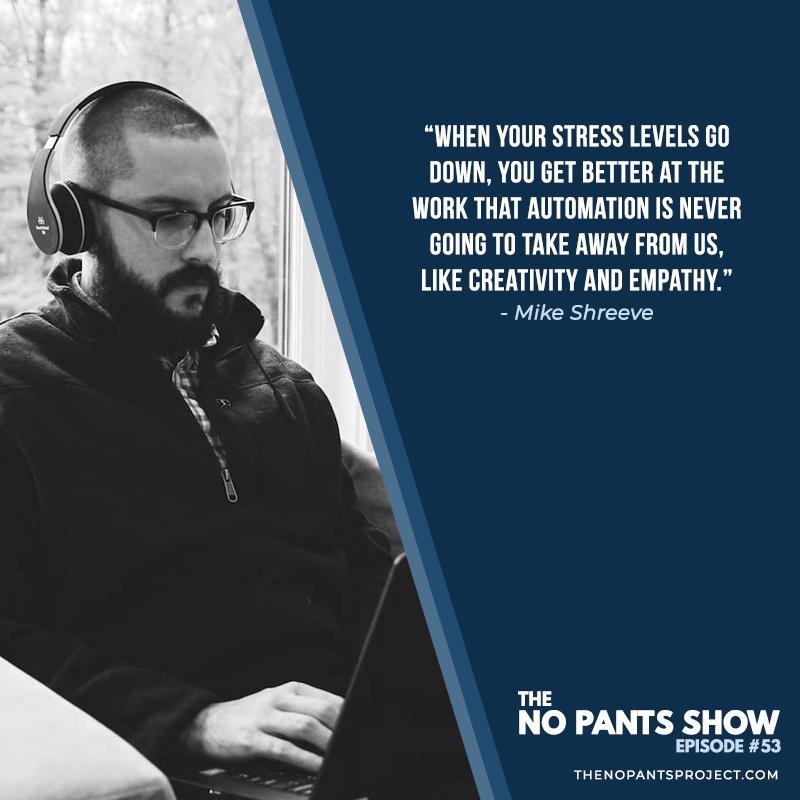
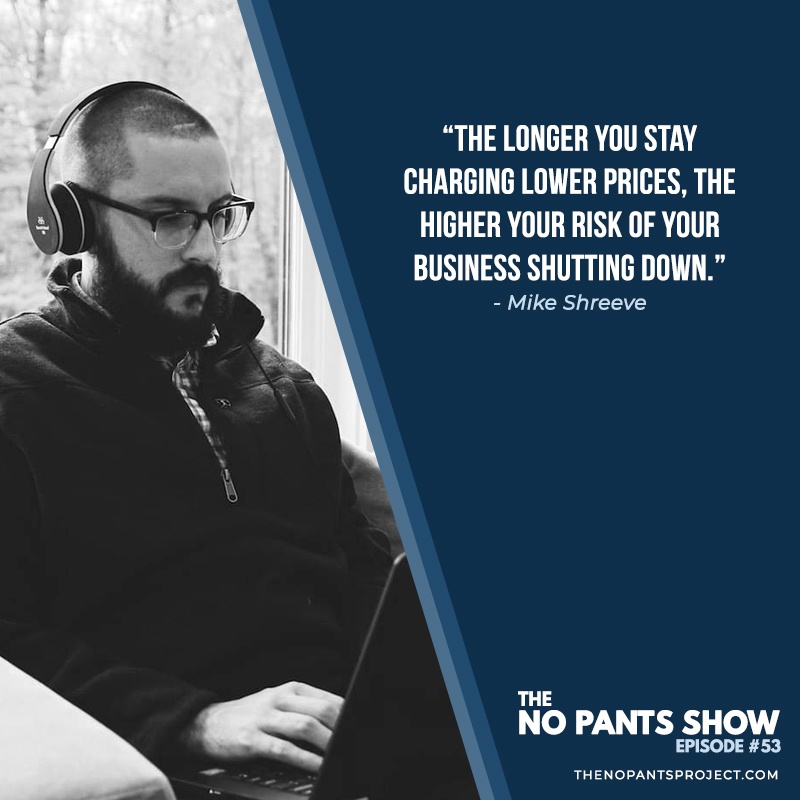
FULL TRANSCRIPT
Hello, my good friends, Mike Shreeve here, founder and head troublemaker of the No Pants Project. You are listening to episode 53 of the No Pants show. We’re going to be talking about the six reasons to raise prices.
A lot of people, I think, have a desire to raise prices but have some kind of internal fear or self-talk which prevents them from doing so.
For example, you might think to yourself, “Well, if I raise prices, then I need to deliver 10 times the results that I’m delivering now and I don’t feel confident that I can do that.” Or you may have internal self-talk which says, “Who am I to charge and make that much money? I didn’t go to medical school for 12 years. I shouldn’t be able to make as much of a doctor” and all these really weird ideas that we have about money, what money means, what value exchange means, and our role in that process and in what we do and don’t deserve.
Now, I’m not going to dig deep into those reasons in this podcast. Instead, I want to give you some … I want to take more of a logical tack, okay? To show you why it’s worth working on that internal self-talk, okay? To give you a compelling reason to do whatever training, read whatever books it is that you need to read so that you can take this important step in your business because the reality is, the longer you stay charging lower prices, okay, the higher your risk of your business shutting down. Okay?
Let me explain this very, very quickly.
A business only survives on its profit margin and how comfortable that margin is. So very quickly, a little Business 101 lesson. If you are constantly just barely making the bills, right? And in your case, your business bills, you don’t have payroll, you don’t have staff, you don’t have software, you don’t have 50,000 things that you have to pay for, but your bills are your life bills.
So if your business is just barely making your life bills, it takes very few bad things to happen and your business shuts down. Okay?
Now if you’re running, say, something like the No Pants Project where we have staff and tons of software and all sorts of consultants and all sorts of things. If we don’t have a healthy, comfortable profit margin where it’s easy for us to pay our bill, let’s say we have two weeks in a row of bad sales, the business could be over.
So, again, the reason that you want to really think about raising your prices is because the longer you stay in this low price game of trying to be the cheapest, the higher the risk is of your business completely failing.
So this isn’t about being selfish. This isn’t about being a money grubber. This isn’t about trying to take advantage of people. This is about staying afloat.
This is about staying and building a healthy business that continues to thrive rather than is one or two bad days away from failing.
All right, so here we go, six reasons to raise your price.
Reason #1: Fewer clients at higher prices equals deeper attention to each of those clients.
Number one, the higher your price per client, so the more you charge per client, the deeper your attention will be on those clients because you need fewer of them.
Too many freelancers play the volume game. “I’m going to have 10 clients. They’re going to give me one blog post a month.”You’re constantly shifting your attention from client to client to client to client because the reality is no two clients are the same.
It’s one of the great things of being a freelancer that you get to have variation. You can work on this client’s project and they like things a certain way and then you work on this client’s project and they like things a certain way and you work in their systems and that, but when you have too many of those variations going on and you’re doing too many task switches, so going from this way to do it to that way to do it, this type of project to that type of project within really any given timeframe, much less a single day, like a single work day time frame, you are unable to reset your attention on the new project long enough to get into it deeply, which means everything you turn in for the client is your surface level work at best. It’s not the deep work. It’s not your best ideas. It’s not the best creations that you’ve made.
So, because you have too many clients because you have to, because you have to make your bills and you’re not charging them each individually enough, you’re never able to turn in the best work. You’re never able to … So, deep attention.
One of the benefits of deep attention is that you see things that you don’t normally see when you aren’t … when you’re more distracted. Oftentimes, let’s say you’re doing content or copy, something like that, that’s when you come up with the best ideas. That’s when you come up with that blog post idea that goes viral. That’s when you come up with the angle for a sale. It’s not in shallow attention that that happens. It’s in deeper attention.
So, when you’re able to mull the project over in your head instead of jumping from to client.
Okay, so number one, the best reason for raising higher prices is because you’ll have fewer clients. When you have fewer clients, you’re able to apply deeper attention, which produces better work.
Reason #2: Raising your prices allows you to pay for training so that you can become better at delivering on your promises.
Number two is that, and this is so important for those of you who feel that your limitation to charging higher prices is that you maybe don’t have as much technical skill as the next person or as somebody who might charge that much.
When you charge higher prices, you are putting into your business an education budget. So by you saying, “This is how much it’s going to cost for me to do this for you and to give myself the training required to do a good job for you,” the net end result of that action is you become better at what you do and you deliver better results.
So a lot of people say, “I’m going to wait to invest all of my money into education before I have a client,” right? That’s the sort of the traditional, go get your college degree and then go get a job.
The reality is, is that while that’s a system that someone set up, it’s not the only system for developing yourself as a person and running a freelancing business.
So one thing that I’ve done, an all you have to do is just be transparent, right? Don’t make claims that you can’t truly, honestly keep, don’t make promises that you can’t keep, but if you’re open and honest and let’s say somebody says, “Hey, you know, I love that you write blog posts, but I really also need help with Google ad words. Man, if you could do that also, I would be able to pay you this much.” You say, “Look, here’s the deal. I am really good at blog posts, but I don’t know a lot about Google ad words. However, I’d love to be the person who does that for you. If you’re willing to pay X, Y, Z, I can reinvest that into the education that I will need to get you the results that you’re looking for.” Then what happens is, one, you obviously increase your skill, but two, you develop the habit of always pricing at that level.
So people often ask me why I still freelance even though I have a fiction income stream and I have the No Pants Project income stream. One of the reasons, and maybe sometime I’ll do a whole podcast episode on why I still freelance even after I’ve got all this other stuff going on. One of the reasons is because I love it when somebody else pays for me to learn something.
Every single client I have has paid for me to learn something, whether it was directly or indirectly, but that only occurs when that is built into the budget and into your pricing.
Whether or not your client in that moment needs you to learn something new, put it in there anyways because you’re the number one … You’re really the only asset in your business as a freelancer. You need to develop that asset, otherwise your business never grows.
Reason #3: Less financial stress equals better focus and creativity.
Okay. All right, so number three, when you have higher prices and you’re meeting your bills every month, more comfortably, your stress goes down, right?
For most people, most of their life stress comes from money. So, if you are able to price your services appropriately so that you can have fewer clients, which means you get deeper attention, but also just means you’re less stressed in general there, but then to have enough money to meet your bills comfortably, your stress levels go down.
What happens when your stress levels go down? You get better at the important work. You get better at the work that automation is never going to take away from us, which is things like creativity and empathy, right?
It’s difficult to be empathetic and creative when you’re stressed out of your mind trying to figure out how you’re going to make payroll this next month, or how you’re going to make your rent this month, right? I think every human being has been there, except for maybe a very small select few, where you’ve just been like, “Ah, how am I going to pay the bills this month?” If you can think back on that time or if you’re in that right now, imagine how much better you would be at the delivery, how less distracted you would be, and how much better your work would be for the client.
So again, those of you who are going, “I can’t charge higher prices because I’m not that good yet,” what I’m saying is, to be good enough to charge higher prices, you need to charge the higher price because the higher price gives you the flexibility. It gives you the time to go educate yourself. It gives you the the money to go educate yourself, but it also gives you the ability to put more attention on the project. It gives you the ability to reduce your stress so that you can produce better work.
Reason #4: Clients who pay more have less drama.
All right, number four. Now, this is so important. Literally like 20 minutes ago I was just chatting with one of my support staff for the No Pants Project and I was reminded of this concept, and it’s so, so important, that people who pay higher prices tend to be lower drama.
I’ve been in business for myself now for 10 years and I cannot … I don’t know why it is. I don’t know what psychological, psychographic, demographic, I don’t know what causes this phenomenon, but without fail, the people that pay you $1,000 versus the people that pay you $100,000, not all, but there seems to always be a subset of individuals, the lower you charge who just tend to be higher drama.
Even if, okay, even if they are the most beautiful, amazing, wonderful human being in the world, if they can’t afford to pay you higher prices, there’s a very high likelihood that the reason they can’t pay you that is because they themselves are in financial stress.
When they are financially stressed out, when people are financially stressed out, they do crazy things. I don’t want to get too political here, but most crime is committed because of financial stress. People don’t wake up one day and say, “I want to be a drug dealer.” They say, Crap, I need to pay the rent. That seems like a much better thing that I can do than anything else I can do” and that starts the cycle, right? Or “I’m going to Rob this bank, not because I love robbing banks, but that seems to be my best option under the extreme financial duress that I’m in at this moment.”
So when you look at somebody who has the means and ability to pay you a lot of money versus the individual who doesn’t have a lot of means or ability to pay you a lot of money, it doesn’t matter who they are as a person. Okay. Let’s just put that aside for now. I’m sure there may be some aspects to that as well, meaning the individual who’s constantly looking for a good deal is probably just generally … who’s always trying to haggle you down, is probably generally just not necessarily a pleasant person to work with. They’re always looking for the negative or they’re always looking for a reason why it might not be as good, et cetera, et cetera, but let’s put all that aside and let’s just say somebody who only has, let’s say they only have $2,000 in their bank account, okay? They pay you $1,000 for something, okay? What they have just done is, they didn’t pay you $1,000, they gave you 50% of everything that they have left versus somebody who has $100,000 in the bank account and gives you $10,000 okay?
So you charge them 10 times as much, but because they have more money in their bank account, they only gave you 10% of what was in their account versus the person who gave you half of what was in their account. What do you think happens as a result? Well, the person who gave you half of everything they have, can you really blame them when their expectations meet their reality? They gave you half, that’s how much they trusted you, of everything that they have and so their expectations are super high.
On the flip side, the person who had a hundred thousand and gave you 10,000, that 10% of what they have, it’s a lot. It’s not nothing, but it’s not half.
Completely different set of expectations.
So one of the reasons to raise your prices and to stick to them is to put yourself in a position where you’re only affordable to people who have the ability to pay that kind of money and it not be everything that they have. It’s something that we don’t think about, in terms of we look at at price as a fixed number, but really the way to look at price is how much is a percentage of what this person has am I asking for and what will the expectations be as a result?
This is a very hard lesson that I’ve had to learn this year in transitioning from working with multi, multimillion dollar companies where them spending $12,000 a month on me to do less than part time work was like no big deal to then operating the No Pants Project where a lot of the people that we work with, they’re giving us a pretty large portion of what they have left. Right? Because they’re not already a multimillion dollar company. They are typically … We work with a lot of people who are newer or who don’t yet have their company successful. So one of the less … That’s a big lesson that I’ve learned this year is it’s not about the dollar.
When I very first started this company, I was like, “I don’t understand.” I just didn’t understand it. I was selling a product for $1,000, which included coaching and, and then $3,000, and that included all this other stuff in bonuses and accountability and just like crazy amounts of value.
I had friends who were also selling something similar and they were selling it to a different audience and they were charging $10,000 and I was struggling to get people to pay three. I thought, “Man, maybe I’m just not good at this anymore. Maybe I don’t actually know how to market stuff. It was all a big farce for 10 years.” Then I realized, no, it’s because who you are asking money from determines the expectation and the ability.
So, raising your prices is very, very important for decreasing that unrealistic expectation, which I think many people … They feel they have an intuition of, “Man, if I raise my prices and I’ve been working with people who are already struggling to pay me,” what they don’t realize is that when you raise your prices, you’re completely changing who you’re working with, right?
If you did try to raise your prices on people who you’re already taking a big portion of what they have and they tend to be drama because of that, then yeah, it makes sense, but when you raise your prices, you’re trying to raise your prices to a point where only the people who can afford it can afford it.
Reason #5: Grown-up expenses.
Number five, you need to raise your prices because most freelancers don’t take into account the grownup expenses of taxes, insurance.
One of the things that I like to do, any income stream that I have, I try to save up. It’s not easy. I’m not saying it’s easy. I don’t have Lamborghinis. I don’t have a big, fancy house. My house is quite simple. I don’t have my ranch yet. I have a goal of a thousand acre ranch. I don’t have that yet because every time I start a new income stream, I try to do three things.
One, from that income stream, I try to have two years of operating expenses, right? If you’re a freelancer, that’s kind of easy, right? Maybe you have like $300 a month in expenses, so you just do 300 times 24 months. That’s how much you need to save up.
Or if you’re running Facebook ads, you want to save that.
So, you just want to have two years of operating expenses because if something happens, if a recession happens, if you have a dry spell with clients, you’re able to to still basically function for two years as a business and not really be stressed out.
So that’s number one that I try to do and then number two is I also, per income stream, try to put together one year of living expenses and put that in an account, keep it separate.
The reason that I do that is because when you have … You need two years of operating expenses as a business because if something really, really bad happens in a business, you don’t just keep the business going. Sometimes you have to make extra expenses, right? You need to maybe hire a marketing consultant or you need to do a big advertising spend or something like that might happen, but with living expenses, the opposite is true, right?
With living expenses, you can tighten your belt over time so you can stretch that year long savings out. You can move into a smaller apartment or a smaller house or sell the house that you live in. Or if you’re renting, a typical lease is only six months to a year. So you can …
There’s things you can do to reduce that expense. A little bit more difficult to do with a business because often business needs capital investments. So, that’s why I say two years for business, one year for personal, but most freelancers, when they’re pricing, when they’re creating their price, they just think to themselves, “How much do I need right now in this moment? How much do I need to get by? How much do I need to survive?”
What I’m suggesting is that a business is something that you build so that you can begin to think about the grownup stuff, the taxes, the insurance, the savings. That’s the point of building a business. There’s too much risk involved, okay?
To build a business just to survive. All right? You’re much better off just going and getting a job to survive because you don’t have any risk, right? Worst case scenario, you’d get fired and you’d go and find another job, but a business, if you’re going to take on that risk, and there’s definitely ways to mitigate risk, but if you’re going to go that way, you ought to do it because you’re trying to advance your financial wellbeing, to make it an investment, to make it something that pays off more than if you were to just take those same skills and plug yourself into somebody else’s company. So that’s number six, or sorry, number five on why you need to raise your prices.
Reason #6: When you raise your prices, you have a budget to hire help.
Then number six is sort of the advanced stuff. Really, this is once you have the other five taken care of. Of course you don’t have to wait until you have two years of business expense saved up, but maybe you’re in the process of beginning to save things up, start to save some money.
I’ll tell you, I’ll be straight up honest with you, it takes me several years to save up two years of business expense. So that’s more of a goal than necessarily something that like within the first two months, I have two years. No, it doesn’t work like that. It’s put a little bit away knowing that’s what the goal that you’re trying to reach and moving from there, but number six.
So here’s number six. This is the reason to raise your price, the advanced version. It goes like this. At a certain point in your business, you’re going to end up with, let’s say, a list of a hundred things that need to happen every month for your business to work, plus a list of a hundred things that your life needs in order for your life to function. Okay?
The reason to raise your price, the advanced version of taking care of reducing stress and focusing more, is to hire help.
So, for example, one of the first hires that I ever made, and she was so awesome, and I haven’t worked with her in a long, long time. She went on to go do her own bigger, better, awesomer things than working for me, but her name was Misty.
It was one of my very first hires many, many years ago and all she did, we called it an account manager. All she did is she just talked to everybody. That was her job. She talked to all my clients. She talked to potential clients. She dealt with customer issues. She dealt with all of the talking and communicating and human stuff because I wanted to focus in on the craft. I didn’t want to have to be answering emails for two to three hours a day because a big part of my freelancing is that I’m a writer. So I didn’t want to waste all that writing energy and focus on answering emails, and then finally at the end of the day, get to the sales letter and be like, “Ugh, I’m beat. Right? I don’t have anything left in me.”
So I hired Misty and it was only part time and I just forwarded all the emails to her and et cetera, et cetera. That allowed me to really deep dive into going narrow and deeper and focus and stress reduction on the craft of writing and copywriting and that was very, very helpful, but it’s not just about adding staff. Sometimes it can be hiring mentors. Right?
I was trained by David Garfinkel, who’s one of the greatest copywriting coaches of all time. I’ve hired many other coaches to help me become better at what I do.
I was only able to hire those people because I built in that price of education into my pricing. My clients paid for it, whether directly or indirectly. I didn’t pay for it myself because I built it into the business because I knew that’s one of the things that I wanted the business to give me, but there’s also another level to this, which is in your personal life.
It has been many, many years since I’ve mowed my own lawn. Now, there may be some people like, “Well, you need to be the man of the house and mow your lawn.”
Actually, what I do instead is while someone else’s mowing my lawn and doing a better job than I could ever do, I’m playing with my kids. I’m able to focus on playing with my kids or I’m hanging out with my wife or I’m … We do that for a lot of different things. We have a lot of different help that comes in that we pay for because of our higher prices, meaning the higher prices I’m able to charge. Okay?
The end result for the client is I’m better able to serve their needs when my needs are being taken care of. Too many people look at price as a battle. I’m going to extract money from you and I’m going to steal money from you and I’m going to trick you into paying me more money. That’s not how it works. If that’s your mentality around how money exchange works, that’s something you need to work on. That’s a personal thing that you need to overcome because that’s not the reality of money exchange.
The reality is, because we don’t barter anymore because it would be too complicated for the economies that we run now, and instead we have a standardized monetary system where we’ve all agreed that this thing called a dollar or a pound or a Euro or whatever it is that we’re talking about, that it is worth a certain amount of money. We’ve all agreed upon that. Instead of trading our services, we trade that for certain things.
So instead of me going to a client and a client saying, “Hey, look, I need you to do this. You’re very skilled at it. It will bring me lots of value if you do it,” and then you coming back and saying, “Okay, well, I need you to give me a month’s worth of groceries. I need someone to come and clean my house. I need you to arrange that and convince someone else that they … and then … “
So instead of going through that, what would be a logistical nightmare, we just say, “Give me this much money and what I will give you in return is the best version of myself and my skills, because what I will do with that money is put myself in a position, surround myself with the things that I need to be the best that I can, education, help, a break, financial security so I’m not constantly stressed.” It’s not about, “Let me take all of your money so I can go spend it on dumb stuff, on materialism so I can just consume, consume, consume.” It’s “What you’re paying me allows me to be the best version of myself, the most focused, the best trained, the happiest, the most in flow, the least stressed version of myself. I will contribute to you, client, whatever your goals are, and that exchange will allow us to both achieve what we want to achieve.”
So that’s it, my dear friends, six reasons to raise your prices.
Recap
Let’s do a quick review.
Number one, fewer clients at higher prices equals deeper attention to each of those clients.
Number two, raising your prices allows you to pay for training so that you can, in fact, become better at delivering on your promises.
Number three, less financial stress because you’re just frankly making more money equals better focus and creativity. That’s just a fact. We can have a discussion about politics. People who have less money are just stressed out more. Period full stop. There’s no such thing as like, yay, poverty. No, it’s horrible. It sucks. It’s very stressful. So, by charging higher prices, you become less stressed and you are able to achieve better focus and creativity.
Number four, clients who pay more have less drama.
Number five, grown up expenses is one of the reasons why you need to raise your prices so that you can be financially responsible.
Then number six is sort of the advanced version here. When you raise your prices, you have a budget to hire help, which allows you to focus even more on your areas of your superpower, your areas of genius. It allows you to get even more out of the idea of reduced stress, more focus makes you better at what it is that you do.
All right, my friends, that is it from me for today. This has been six reasons to raise your prices.
If you’d like help on figuring out what you need to do, how you need to do it, what you need to say, who you need to say it to, to be able to raise your prices in your business, please go to the nopantsproject.com.
Check out a free training that we have. It’s how I built my business up to multiple six figures per year as a freelancer, so this is just freelancing, offering my services. We go into the mechanics of what needs to be in place in order for you to be able to find the people that we’ve talked about in this episode.
Again, it’s thenopantsproject.com. That’s it for me, my friends. I will see you in the next episode.

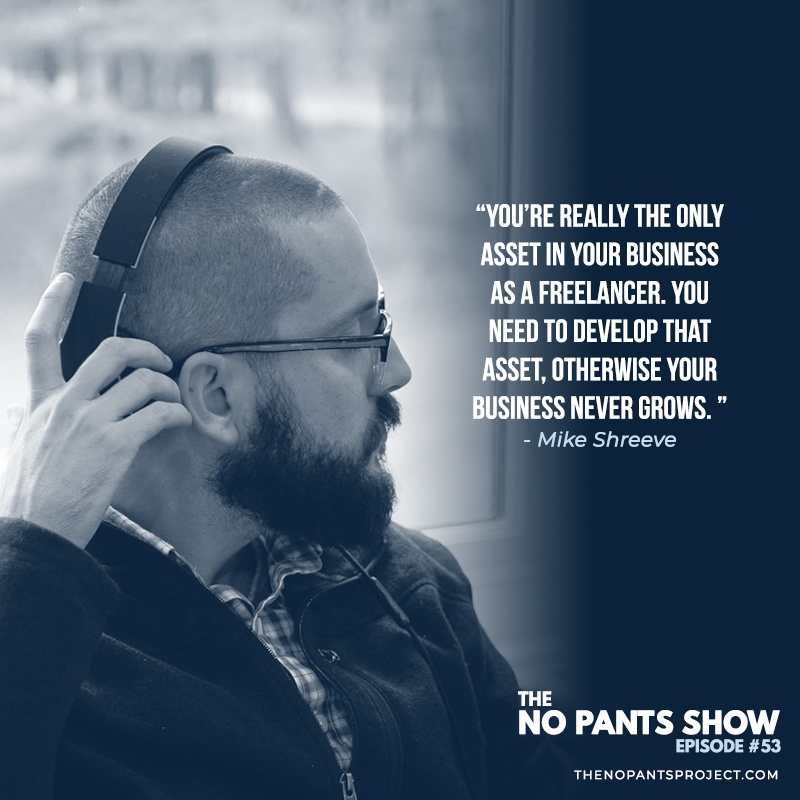
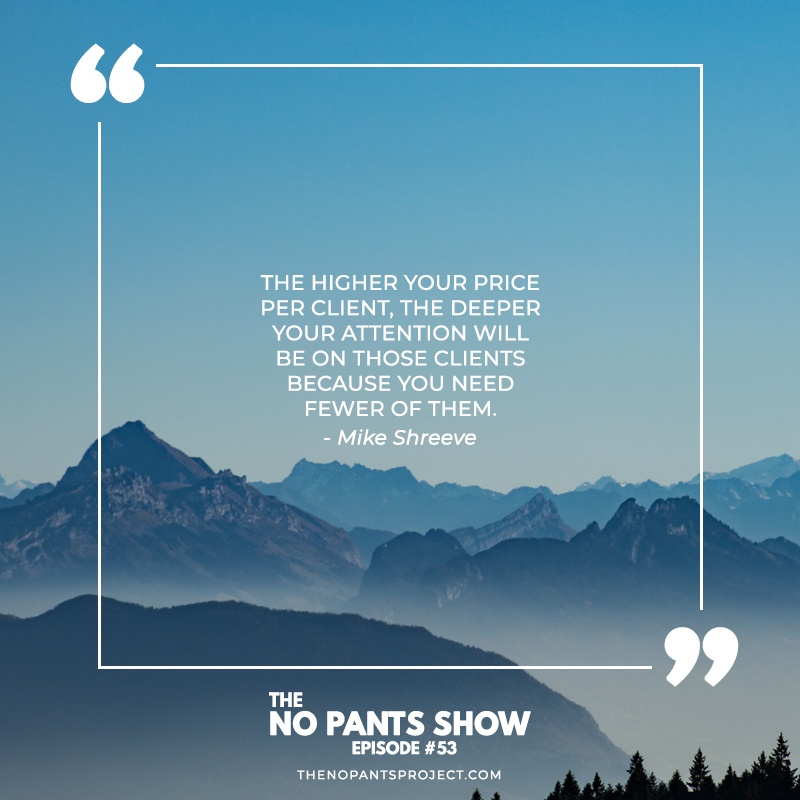
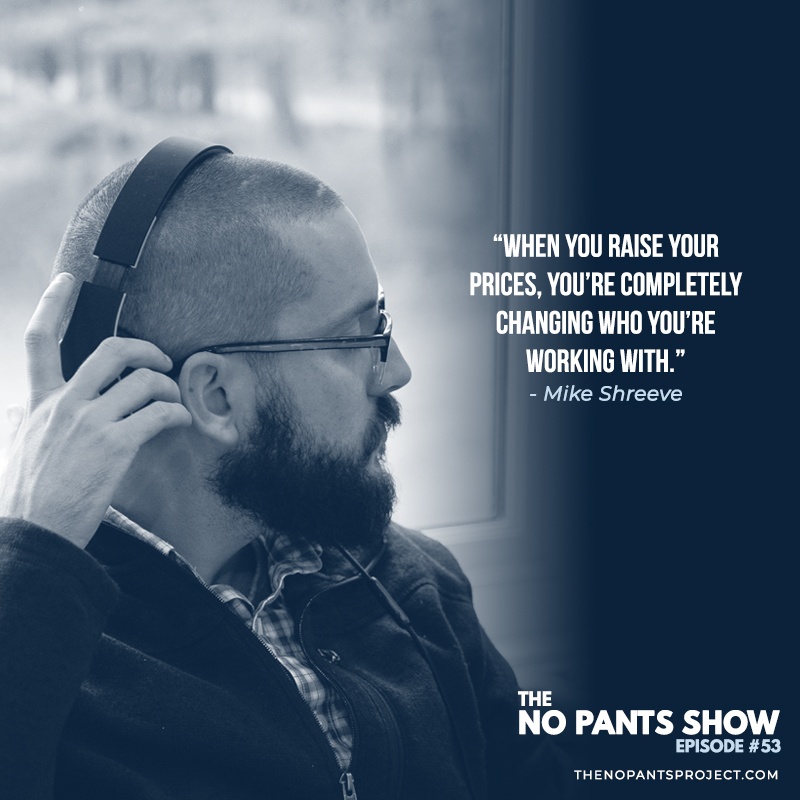

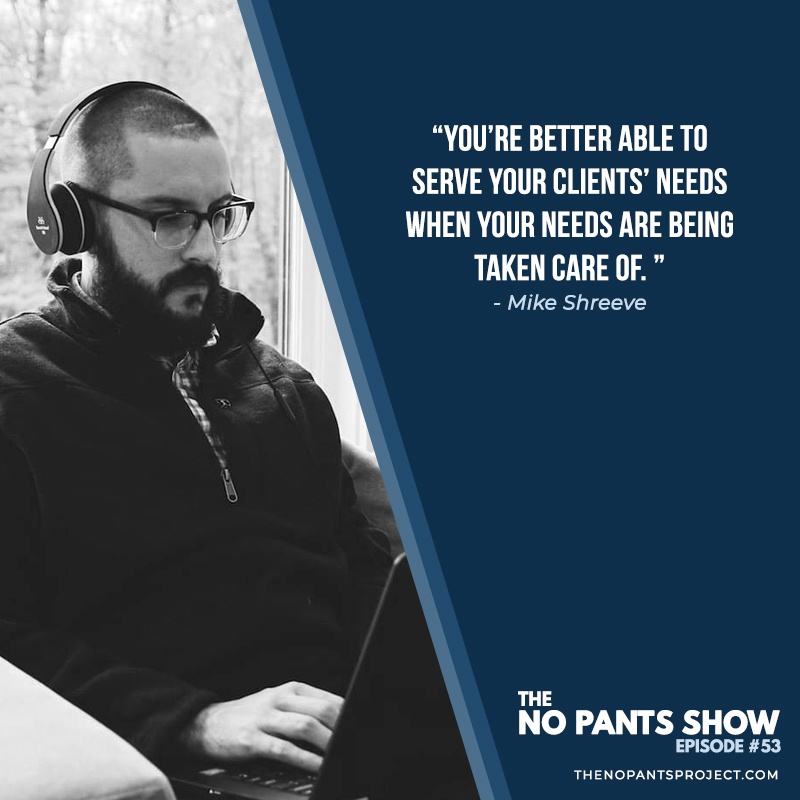


![The Ultimate Guide to Creating a Client Winning Freelance Website [Part 1]](https://www.thenopantsprojectblog.com/wp-content/uploads/2017/11/The-Step-by-Step-Guide-to-Setting-Up-Your-Freelance-Website_thumb-768x467.png)